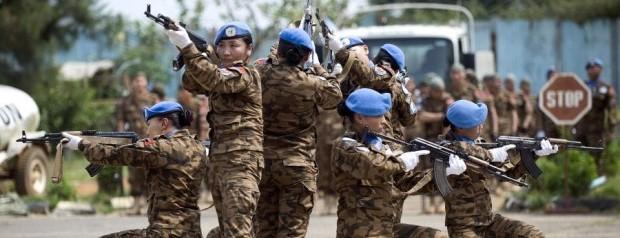Darfur: Mixing Shades of Grey
Darfur had everything needed to be a good, eye-catching story: good guys, bad guys and no moral ambiguity. Sure enough, it became such a big story because it was able to be presented in this way.

In “a continent of messy, difficult wars, this was a simple conflict,” correspondent Rob Crilly writes of how it was presented in 2004 when the story broke. Then when the genocide angle was thrown in, the media had its “Darfur puppy,” a “heart-rending human story with big brown eyes that no one could ignore.”
And it was a big story: in July-August 2004, no fewer than 18 editorials were published in the British broadsheet newspapers on Darfur (the Daily Telegraph published three editorials in five days), when Darfur had barely been mentioned 15 times in the entire previous decade.
In Saving Darfur: Everyone’s Favourite African War, Crilly presents what he calls Darfur’s “esoteric detail” (the nuances, complexities and non-sequiturs of conflict), the stuff that, properly told, should have been part of the narrative from the start. If it had, if the complexities had been fully attempted from the beginning, would Darfur have been just another Congo to the Western media — the odd news-in-brief paragraph?
One main theme of the book is that Darfur’s diagnosis has been wrong, causing the region harm from the outset (“prescriptions based on the wrong diagnosis rarely work”); the grand narrative has been too absolute, too resistant to change, and sustained too far away from the Sudan that Crilly covered.
Covering conflict requires a journalist to pick his or her way through various minefields, balancing truth and objectivity with misinformation and propaganda, all the while retaining a sense of perspective on events, none of which is a recipe for simplicity. This book is the first that I am aware of which sets out to provide a journalist’s eye account of Darfur’s “black and white certainties… mixing into grey,” as the author puts it.
One of Crilly’s main gripes — and of many others besides — is the unhelpful simplification of combatants and victims into “˜Arabs’ and “˜Africans.’ While undoubtedly these are relevant terms, their cultural significance is far greater to understanding Darfur than any ethnic connotation, yet the ethnocentric gaze of the Western media greatly favours the latter (ethnicity) over the former (cultural distinction).
The author at one point focuses this gripe far more closely, recounting how his own editors had inserted words like “˜black’ and African’ (“liberally”) into his article intros, when he had purposefully omitted such terms. If further proof were needed that such simplified narratives can be actively constructed and sustained, this is it.
As Crilly points out, both groups — the supposed Arabs and Africans — are aware of the nomenclature and have fed the terms’ ethnocentric significance back into the narrative, at the expense of cultural significance.
If Western media attention is ethnocentric, then — particularly in the case of the “˜Africans’ — that is the register used to describe themselves and their cause, because Western attention, when properly used, can be lucrative and strategically beneficial. Some analysts argue this encourages “˜strategic victimhood.’
The cultural identities that the inhabitants of Darfur understood among themselves have been rapidly eroded by the pragmatism presented to them; a case of subordinating their own traditions, experiences and right to define themselves to the Western interest which had limited time, space and motivation in which to understand the nuances and finer details.
Thus the divide in Darfur is entrenching along ethnic lines, which is harder to reconcile than cultural difference.
However, as the Darfur grand narrative developed, the information began to flow both ways, and for Crilly, seeing the narrative flow back into Darfur itself came with its own poignancy.
He writes that what is harder to deal with as a journalist than the tales of misery — “mothers holding skeletal children as they tell how their village was burned and their menfolk killed” — is “hope: the belief that the outside world can solve the problems of Darfur… in short, the faith that people in faraway lands give enough of a damn to really make a difference.”
Sensing the unlikelihood of intentions, and therefore capacities, of the Western world to effect lasting change (position statements and condemnation proved only to be rhetorical), Crilly “felt like a liar” as he addressed a hastily-arranged group of Darfuris in Jebel Mara who were hoping to be saved – to them, the logical next step from all the attention received.
Today, now that the West’s compassion has fatigued and dull-sounding labels such as “low-level conflict” have caused the media to turn away, Crilly’s account of covering Darfur confirms that a story is still very much there, as his numerous and recent trips all over the region testify.
Huge chunks of the population are still in camps, unable to return to their homes and livelihoods, and the “˜peace process’ is viewed more with dutiful optimism than with the confidence to produce results.
Despite all the Western media attention, advocacy and activist efforts since they swung into action in 2004, Darfur has not been saved; only its politics and their attendant morality have been revealed to be more complex than previously thought — hence Darfur is no longer everyone’s favourite African war.






This info is so great thanks!